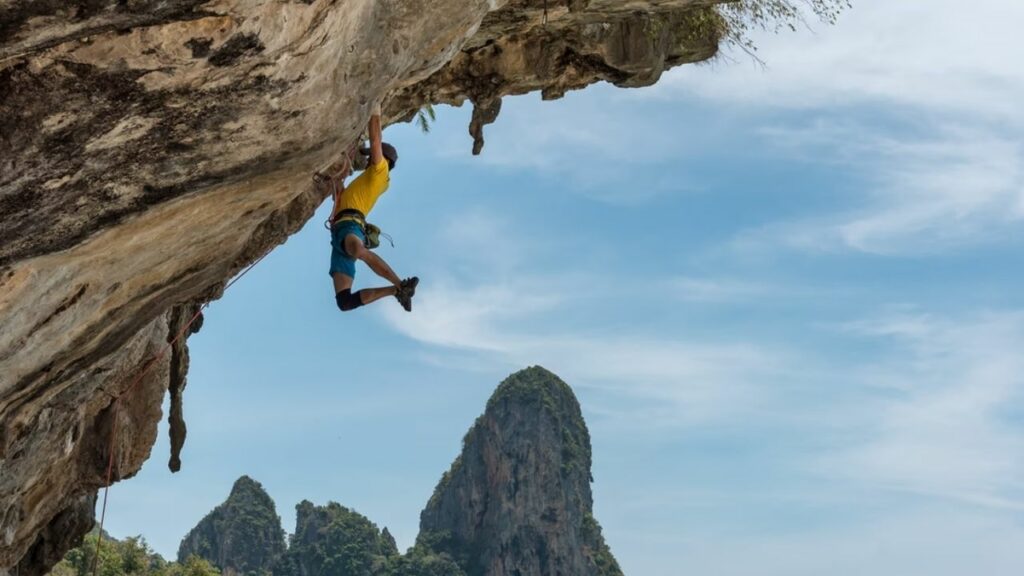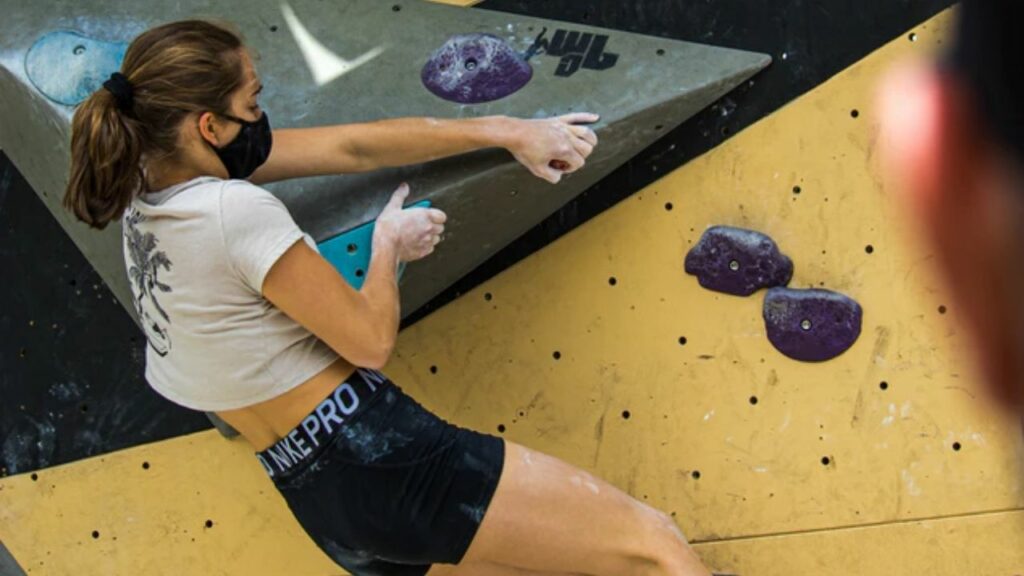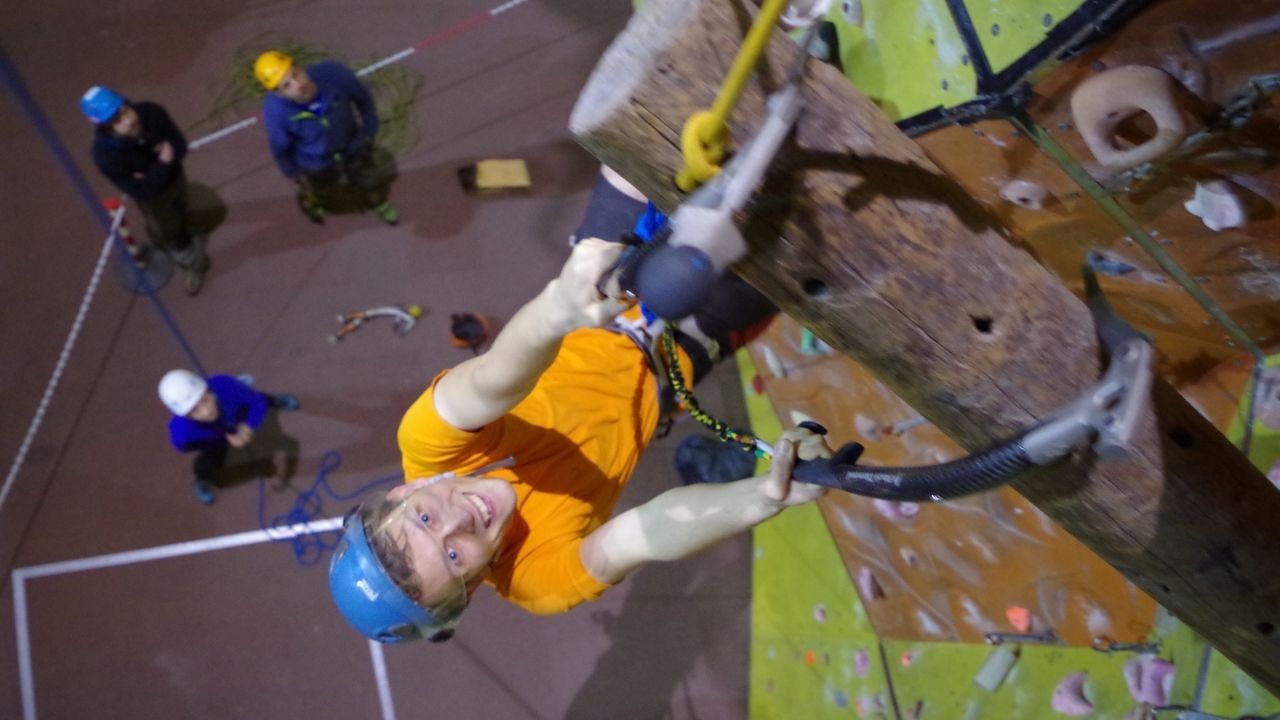I first set foot to slab on my first climbing course 25 years ago. Young and eager for adventure, I fell in love with rock climbing and bouldering pretty damn fast. Though, behind-the-scenes, progressing from beginner to intermediate, on to advanced grades and circuits has been a journey full of ups and downs.
I shudder when I think back to the foolish climbing mistakes I made as a novice. I was your average gumpy climber geek, naive and unmentored, aimlessly lurching my way up some random beginner-friendly route.
Even when I practiced pre-sequencing the beta, I still wasn’t physically or mentally strong enough to grip and hang on. It took a couple of jaw-dropping (and 100% avoidable) tragedies before I started prioritizing strength training, footwork technique, and the right mentality to manifest my inner climbing genius.
Let’s help you avoid those same silly mistakes.
1. Constantly comparing yourself
When healthy competition turns into unhealthy comparison, you risk sabotaging your performance, skill development, and collaborative learning.
Starting out, I couldn’t help but compare my progress to other climbers who started around the same time as me. I used to think that everyone was watching me. This feeling of “someone’s watching” and the fear of looking dumb led to inner turmoil rather than progress.
When you focus on appearances or “imaginary competition,” you may tackle more climbing problems, but you’ll miss out on the pivotal grunt work. Instead of attempting a next-level bouldering problem or, you may stick with the easier climbing routes to look good. So stop comparing.
No matter how good you become at climbing, there’s always gonna be someone better. Maybe it’s their athletic stature or naturally long limbs – the reason doesn’t matter. Truth be told, you’re all on the same team with two shared goals – getting good at climbing and having a lot of fun.
2. Being a bad observor
There’s a lot that others know how to do, but you won’t.
Become a good observer for the times you’re warming up or taking a break at the gym. Notice other climbers – how they’re making certain moves and positions. You can learn a lot just by looking at the climbers better than you.
Also, develop a habit of paying attention to your surroundings when climbing. You should know if someone is coming from your left, right, above, or below for your safety and theirs.

3. Not discussing beta with others
Never be ashamed to ask for help. Discussing beta with fellow climbers will expand your limited knowledge of rock climbing.
I can’t count how often I was stuck at one impossible move, only to realize that my entire approach had been lopsided from step 1.
Trust me, you’ll perform better in the short term and long term if you feed off seasoned climbers and your climbing buddies. In my decade-long tenure, I have found that most climbers are eager to help others. It’s what makes the community so amazing.
It’s not something you must always do since you have to be able to find solutions yourself. And by discussing, I don’t mean spraying your beta onto others who never asked or disregarding indoor and outdoor rock climbing “etiquette.”
4. Avoiding or skipping the warm-up
If you have worked out before, you already know this. But many new climbers haven’t spent time at the gym. You would think that it’s counterintuitive to do exercise before exercise. But warmup is different.
We warm up to engage the muscles and increase the blood flow to the limbs. Turning on the “flexibility mode” in your body is especially important. Think of it as kickstarting an old motor and letting it run for a minute, so it heats up.
You can significantly decrease the chances of a climbing-related warm-up with only a 15-minute warm-up.
5. Lack of good footwork
Footwork is the most important in climbing. Especially when it comes to tricky slopes and rough areas on the rock wall face.
Most beginners don’t know that a good climber climbs with their feet and not forearms. You HAVE to master it instead of focusing on only building upper body strength.
Balancing and manuevering for friction requires stable footwork more so than explosive forearm strength.
Train your toes; you can put your entire body weight on them, provided you have good climbing shoes. Having stable footwork centered around the toes is great for maneuvering.
Make it a rule to not go home without practicing and building your footwork and balance. Doing so will allow you to send it higher and harder and progress quickly from a beginner to intermediate climber.
6. Looking at your arms instead of your feet
I’m not going to lie; I only learned about this fairly recently through a community forum, but it seems obvious now. Look at your feet while you’re setting them up on hold.
Thanks to the skin being one of the sensory organs, you can “feel” the ideal position for hand placement. But your feet won’t have that luxury because of the shoes.

Most beginners fall due to bad and unstable footwork. Observing your feet while making a movie will ensure a stable position and prevent your shoes from unnecessary wear and tear.
7. Not climbing with straight arms
Enough about the footwork. Let’s nag you about your upper body mistakes now.
One of the biggest mistakes you can make as a beginner is climbing with bent arms. Surely, you’ll get more strength that way compared to climbing with straight arms.
But, it’s not good for the long term. Climbing with bent arms can cause very painful forearm swelling. You can progress relatively quickly by instilling the habit of climbing with straight arms into your muscle memory.
8. Mental blocks that physically don’t exist
Focus on becoming a better climber, not climbing a higher grade! Newcomers make the mistake of chasing the grade, not real! Why? Because climbing grades are inherently subjective.
An outdoor V3 may feel like an indoor V7, depending on the style. Or, you may be able to one-shot certain V6 boulders but still not clear those few V4s after countless tries. Whatever the scenario may be, don’t fall into the trap of obsessing over the rating.
This doesn’t mean you should try your luck at V4 if you’re barely V2-level. If nothing else, do the beta and discuss it with other climbers. Even if you’re confident in those particular moves, this collaboration will open your mind to possibilities and motivate you to climb mountains and routes with increasingly higher climbing difficulty.
And remember, “winning” isn’t the goal. You should bumble around when you’re learning a challenging new climbing configuration or honing your technique.
9. Not taking care of your body
Take care of your hands religiously. If you don’t sand your calluses properly, they’ll get stuck on the holds and become flappers. Those hurt like the B-word. Use lotion when you’re not climbing to protect your skin.
Some injuries during climbing are inevitable. But that doesn’t make it OK to be lax about your safety. Injuries rarely ever heel 100%, and if you pile them on too much for short-term gains, you’ll regret it in the long run.
Take care of your legs by avoiding injuries. Remove your shoes frequently to stretch your toes out. Do extra warm-ups before doing heel hooks or other strenuous moves.
Most importantly, don’t be afraid to fall. It’s a paradox and a fallacy. You’ll try to go further up even when you’re at your limit because you’re afraid to fall. The truth is that it’s OKAY to fall during climbing – both physically and socially.
In fact, you should proactively learn how to fall. A good climber knows how to fall and when it’s safe to do so.
Tips I Wish Someone Had Given Me As a Climbing Beginner
Be a curious and dedicated beginner.
Acknowledge that progress has a plateau effect in rock climbing and bouldering. As a beginner, you’ll progress fast if you work diligently.

But that ratio will soon flip, and your progress will become slow even with the same amount of work. When that happens, take a step back and analyze your mistakes. Seek advice from experienced climbers who don’t mind helping beginners.
Expect some trolls on the Internet to make fun of you for not knowing “something so simple.” Keep your chin up, and don’t be offended. Instead, try to learn the climbing lingo from Reddit and other community forums. It’ll make communication smoother.
Focus on techniques, not the gear.
As a beginner, you shouldn’t spend too much time and money on your gear. Instead, you must not buy climbing shoes for pros or experienced climbers.
If you don’t get beginner-friendly shoes, you’ll be unable to progress properly. Pro climbing shoes have a massive arch; your feet will be in too much pain to learn anything.
Learn how to do lead belaying properly when you’re done with the basics of climbing. It’ll make climbing with partners much easier, and you’ll always progress faster with a spotter.
Don’t forget to have fun!
Climbing is a tiring activity, and there’s a lot to learn. But you’ll end up hating it if it becomes just another you have to do.
Celebrate your milestones – both small and big. Most importantly, have fun!

